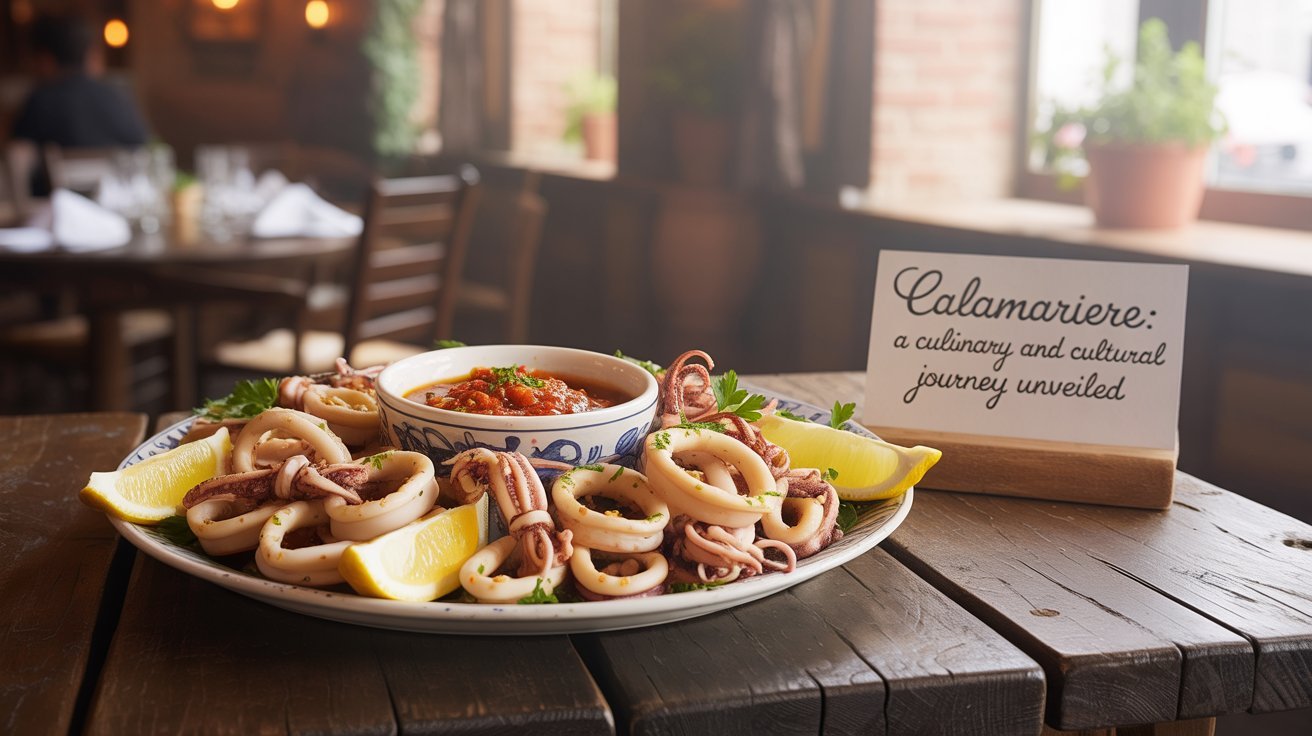Food
Calamariere: A Culinary and Cultural Journey Unveiled

In the ever-evolving world of gastronomy, certain terms and traditions carry a mystique that captivates chefs and food lovers alike. One such term, calamariere, has piqued curiosity with its evocative sound and associations with the sea. Though it may not be a common household word, calamariere holds deep culinary and cultural significance in select parts of the world. To appreciate it fully is to dive into an experience that spans coastlines, traditions, and evolving tastes. This article explores the many dimensions of calamariere, its origin, applications, and how it’s becoming a symbol of refined coastal cuisine.
The Origins and Evolution of Calamariere
The term calamariere finds its roots in Mediterranean coastal culture, where fishing communities have long relied on the bounty of the sea. Linguistically, it hints at calamari, the Italian word for squid, suggesting a relationship with this popular ingredient. However, calamariere extends beyond mere food preparation. It originally referred to the person responsible for selecting, cleaning, and preparing squid in traditional seafood markets and kitchens. This role required a discerning eye, precise technique, and a strong knowledge of marine life. Over time, the calamariere evolved into more than a seafood specialist—it became a symbol of quality and coastal culinary pride.
Calamariere in Coastal Traditions
Throughout history, fishing villages in Italy, Spain, and Greece have preserved unique culinary customs centered around squid. The role of the calamariere was often passed down through generations, combining practical skills with a deep respect for the ocean. In some regions, the calamariere was as revered as the fishermen themselves, entrusted with transforming freshly caught squid into edible art. This tradition reflects not only culinary expertise but also a close connection with nature and the rhythms of the sea. The cultural importance of calamariere is embedded in local festivals, recipes, and even superstitions about the right way to handle seafood.
The Role of the Modern Calamariere
As modern kitchens evolve, the traditional role of the calamariere has been adapted into contemporary settings. Today, it is not uncommon to find chefs and seafood specialists embracing the essence of calamariere in high-end restaurants and bustling marketplaces. The modern calamariere must still possess the core skills of squid preparation but must also navigate sustainability standards, customer expectations, and modern culinary trends. In some elite restaurants, a calamariere is akin to a sommelier, showcasing an intricate knowledge of marine ingredients and suggesting the best pairings and preparations for squid and other cephalopods.
Culinary Techniques Associated with Calamariere
The essence of the calamariere lies in the precision and care of squid preparation. Cleaning squid is a delicate task involving the removal of cartilage, ink sacs, and internal organs without damaging the flesh. A skilled calamariere does this with elegance, preserving the integrity of the ingredient. Once prepared, squid can be presented in various ways—grilled, stuffed, stewed, or flash-fried—each technique highlighting a different aspect of its texture and flavor. In Mediterranean cuisine, the calamariere may prepare stuffed calamari with herbed breadcrumbs and lemon zest, while in Asian kitchens, it may be sliced for sushi or sautéed in spicy sauces.
Why Calamariere is Respected in Culinary Circles
Not every chef can claim the title of calamariere. It requires a dedication to craft, an understanding of marine biology, and a passion for perfection. Much like a butcher knows the anatomy of animals, a calamariere knows the anatomy of squid and how each part can be used. The respect afforded to this role comes from the attention to detail and reverence for the product. In culinary schools and apprenticeships, learning the skills of a calamariere is often a mark of progression from basic seafood preparation to expert-level techniques. As seafood becomes more popular globally, the skills of the calamariere are gaining new recognition and value.
Cultural Influence of Calamariere Beyond Cuisine
The influence of calamariere extends beyond the kitchen into cultural identity. In certain coastal communities, becoming a calamariere is considered a rite of passage. Festivals and celebrations often feature competitions where calamariere showcase their speed and skill in cleaning and preparing squid. These events are both entertaining and educational, preserving age-old techniques while fostering community pride. Art and literature from maritime cultures often include references to calamariere, portraying them as custodians of the sea’s delicate bounty. This cultural influence solidifies their status as more than cooks—they are stewards of tradition and craftsmanship.
How the Term Calamariere Is Used Today
While calamariere began as a role within traditional seafood circles, today it has expanded into branding and identity. Restaurants may label themselves as specializing in calamariere cuisine, indicating a focus on seafood expertise and heritage recipes. In culinary writing, the term is often used to denote sophistication and mastery in the seafood domain. Some food critics use calamariere to describe dishes that embody the elegance and simplicity of expertly prepared squid. This modern use broadens the appeal of calamariere, connecting it with a larger movement toward artisanal cooking and cultural storytelling through food.
Sustainability and the Modern Calamariere
With environmental concerns shaping the future of food, the calamariere of today must also be a conscious consumer. Sustainable fishing practices and traceability have become essential in preserving marine biodiversity. A knowledgeable calamariere sources squid from responsible fisheries, ensuring that overfishing and ecological disruption are avoided. This commitment adds depth to the role, making it not just about flavor and presentation but also about ethics and environmental stewardship. In teaching others about the importance of sourcing, the calamariere becomes an advocate for both quality and sustainability.
Bringing the Calamariere Spirit Into Home Kitchens
While professional calamariere may operate in restaurants or seafood markets, home cooks can also embrace this approach. Learning how to clean and cook squid with care can elevate everyday meals into gourmet experiences. Cookbooks and online tutorials now provide detailed instructions for preparing squid, empowering food lovers to try their hand at becoming amateur calamariere. The act of selecting fresh squid, handling it delicately, and pairing it with seasonal ingredients fosters a deeper appreciation for culinary tradition. In this way, the spirit of calamariere continues to thrive across generations and geographies.
The Symbolism of Calamariere in Contemporary Food Culture
Calamariere has come to symbolize much more than a role or technique. It represents a philosophy of mindful cooking, where every step—from sourcing to preparation—is guided by respect for the ingredient. In a world where fast food and mass production dominate. The calamariere stands as a reminder of the beauty in slow, deliberate craftsmanship. As more people seek meaning in their meals, the principles embodied by the calamariere resonate widely. This symbolism is helping redefine how we view seafood—not as a commodity, but as a cultural treasure.
The Globalization of Calamariere Practices
With the rise of global culinary fusion, the techniques associated with calamariere are being adapted across continents. In Japan, squid is revered in sushi and sashimi traditions, while in Mexico, it appears in seafood tacos and ceviches. Chefs from different cultural backgrounds are adopting calamariere practices, applying them to local ingredients and regional cooking styles. This exchange enriches the culinary world, showing how an age-old tradition can find new life in diverse settings. As culinary borders blur, calamariere evolves, embracing global inspiration while preserving its core values.
Challenges Faced by Modern Calamariere
Despite the growing interest, the path of the modern calamariere is not without challenges. Declining fish populations, rising costs, and a lack of skilled apprentices threaten the longevity of this tradition. In addition, consumer preference for pre-packaged or fast-prep seafood reduces demand for expert preparation. However, a renewed focus on slow food movements and culinary storytelling is helping keep the art alive. Training programs, documentaries, and community workshops are all playing a role in preserving and reviving calamariere techniques.
Education and the Future of Calamariere
For calamariere to flourish in the future, education is key. Culinary schools are beginning to include specialized modules on cephalopod preparation, emphasizing sustainability and technique. Workshops in fishing communities aim to inspire the next generation of seafood experts. Some initiatives go a step further by connecting students with elders who possess traditional knowledge, ensuring it is passed on authentically. As more young people embrace culinary careers, the legacy of the calamariere stands ready to inspire and evolve.
A Personal Connection with Calamariere
For many, the journey toward becoming a calamariere begins with a memory. Perhaps it’s the smell of grilled squid at a seaside market, or a grandparent demonstrating how to clean the catch of the day. These personal moments link food with emotion, forging connections that last a lifetime. The role of calamariere is deeply personal—it involves not just skill, but love for the process. For those who take up the mantle, it is more than a job or hobby; it is an expression of identity and reverence for the sea.
Conclusion: Honoring the Legacy of Calamariere
Calamariere represents the union of tradition, craftsmanship, and culture. From its roots in Mediterranean villages to its place in modern kitchens. It tells a story of respect for the ocean and the art of cooking. Though the word may not yet be widely known, its impact is profound. It teaches us to value the source of our food, to prepare it with care, and to share it with gratitude. As the culinary world continues to shift, the timeless lessons of the calamariere remain more relevant than ever. By understanding and honoring this role, we not only preserve a tradition but also enrich our approach to food and life.

 Blog8 months ago
Blog8 months ago[PPT] Human Reproduction Class 12 Notes
- Blog8 months ago
Contribution of Indian Phycologists (4 Famous Algologist)
- Blog8 months ago
PG TRB Botany Study Material PDF Free Download

 Blog8 months ago
Blog8 months agoCell The Unit of Life Complete Notes | Class 11 & NEET Free Notes

 Blog8 months ago
Blog8 months ago[PPT] The living world Class 11 Notes

 Blog8 months ago
Blog8 months agoPlasma Membrane Structure and Functions | Free Biology Notes

 Blog8 months ago
Blog8 months agoJulus General Characteristics | Free Biology Notes

 Blog8 months ago
Blog8 months agoClassification of Algae By Fritsch (11 Classes of Algae)













